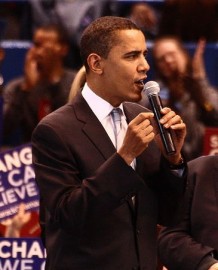
It is the habit of this blog to look at major foreign policy speeches, and who better to report on than Barack Obama, the increasingly likely winner of the American presidential election in November. While Federal Union is strictly speaking a British organisation, American foreign policy affects the whole world, so we are entitled to take an interest. And Obama is increasingly likely to win because he is willing to do the things necessary to make himself electable.
For example, his previous pledge to rely on federal funding and reject private contributions to his election campaign (and thus observe federal funding limits) has been abandoned in the face of his ability to raise far more money privately than his Republican opponent, John McCain. Some people might call this hypocrisy or opportunism; others have said approvingly that this shows he has the determination to win.
If he will make that to his campaign finance position, what will he do to his foreign policy plans?
Barack Obama’s chief foreign policy claim to fame – which he used to great effect in the primary contest against Hillary Clinton – was that he opposed the Iraq war from the outset. This position is clearly in his latest speech on the subject, which you can read here. His earlier demand for a precipitate withdrawal from Iraq has been modified somewhat – he now accepts a timetable of 16 months – which again has been described as a lack of principle by some, but which nevertheless puts him into sharp contrast with John McCain who argues that America should escalate the war in order to win it.
Obama’s preference is to send more troops to Afghanistan, in the explicit hope that the Europeans will send more soldiers, too. The problem here is that the Europeans themselves are not yet ready for more fighting on the scale that would be needed to make a difference in Afghanistan: there is a European reluctance to exercise power around the world that still needs to be addressed.
His third priority is to bring under control the tools and materials needed to make nuclear weapons. He is worried about terrorist groups, and also about rogue states, but he is ready in fact to go further, saying “America seeks a world with no nuclear weapons”. This is quite an extraordinary claim, and a quite different approach from that which says that the only way to deal with a heavily armed world is to be heavily armed oneself. This does not mean, of course, that he is willing to drop his guard until other countries do so, too, but he does believe that it will give America enhanced credibility when proposing that North Korea and Iran should renounce any nuclear aspirations they may have.
Fourth, he shares the American obsession with foreign oil. His solution, though, is not to increase drilling at home but instead to develop alternative sources of energy. And he won’t do this alone: he wants to “build an alliance of oil-importing nations and work together to reduce our demand, and to break the grip of OPEC on the global economy.” It is interesting how Obama sees the way in which America is dependent on other countries, not only in the supply of oil but also in the alternatives to it.
This dependence leads him to his fifth point, the need to rebuild America’s alliances. He wants a greater commitment from Europe in Afghanistan, and to reform the United Nations. He also wants to pursue greater cooperation with the democracies of the Asia-Pacific region, such as Japan, South Korea, Australia and India. (Robert Kagan, adviser to John McCain, has outlined something similar in a recent book, “The Return of History and the End of Dreams”.) And he wants to enlist countries all around the world to fight terrorism.
A speech such as this, by a candidate and not by an office holder, has to be understood not as a detailed set of policies – the constraints of office will soon force changes to whatever plans he might have – but as a means of marking himself out as different from the other candidates and showing where he stands in relation to the current president. On that basis, this is a clear rejection of almost everything George W Bush has done, and also shows some strong differences with McCain.
While both Obama and McCain talk about the importance of allies, and also of alliances, McCain appears to be more interested in formalising those relationships. Obama has not spoken of anything as concrete as the League of Democracies idea. However, in many ways, the crucial issue is not America’s relationships with its friends but rather its relationships with its enemies. Obama confirms that “No tool of statecraft should be taken off the table” – a rather more subtle way of threatening Iran than Hillary Clinton ever managed – but he is ready to offer alternatives to confrontation. McCain seems to be more belligerent, whether in fighting the war in Iraq to a conclusion or in dealing with other threats around the world.
There is a long way to go before the election in November, and Obama’s promise of “change” will continue to be applied to his own policies, I am sure. But right now, he is proposing a substantially new direction to American foreign policy, one which no doubt will find favour in Europe during his visit this coming week.
